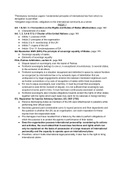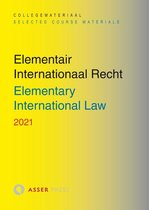*Peremptory norms/jus cogens- fundamental principles of international law from which no
derogation is permitted
*Obligation erga omnes- obligations to the international community as a whole
WEEK 1
Art. 1 & Art. 3 of Convention on the Rights and Duties of States (Montevideo)- page 148
● Characteristic of a state
Art. 1, 2, 3,4 & 7(1) of Charter of the United Nations- page 149
● Article 1- purpose of UN
● Article 2- principles of the organisation
● Article 3 to 4- membership of the UN
● Article 7- organs of the UN
● Article 10 to 11- functions/powers of GA
GA Resolution 2625 (XXV)-The principle of sovereign equality of States- page 175
● Sovereign equality of states
● Elements of sovereign equality
PCA, Palmas Arbitration, section II- page 568
● Dispute based on sovereignty over the Island of Palmas
● Territorial sovereignty belongs to one or, in exceptional circumstances, to several states,
to the exclusion of all others
● Territorial sovereignty is a situation recognized and delimited in space by natural frontiers
as recognized by international law or by outwards signs of delimitation that are
undisputed or by legal engagements entered into between interested neighbours such
as frontier conventions or by acts of recognition of states within fixed boundaries
● For one to argue sovereignty over a territory, it must be proved that sovereignty
continued to exist till the moment of dispute. It is not sufficient that sovereignty was
acquired at some point in time. It must had been continuously exercised or existed.
● Territorial sovereignty also includes obligations towards protect the rights of other states,
together with the rights which each state may claim for its nationals in foreign territory
ICJ, Reparation for Injuries Advisory Opinion, EIL 2021 [738]
● Persons discharging duties as members of the UN were killed/injured in palestine while
performing their official duties
● Secretary general paid considerable sums to injured persons and their dependents and
the question is whether the UN, as an organisation, can claim reparation for these
injuries from the responsible state
● The damages must have resulted from a failure by the state to perform obligations of
which the purpose is to protect the agents in performance of their duties
● Does the organisation possess international personality- considering its actions
and activities, the court stated that it exercises functions and rights which can
only be explained on the basis of possession of a large measure of international
personality and the capacity to operate upon an international plane.
● Therefore, since it holds international legal personality, it also has to the right to bring
international claims
, ● This case established that the UN had the right to bring international claim against a
state with the view to obtaining reparation for damages caused to the organisation and
to the persons entitled through him
WEEK 2
Article 38 of statute of international court of justice- page 162
● Positivist theory of sources of international law
Para 2 and 44-48 of ICJ Lotus Case- page 568
● Defines customary international law relating to states jurisdiction over their territories and
the extent of the jurisdiction of rules adopted by them
● In the sense that it is custom for states to not exercise their power in any form in the
areas where another state exercises jurisdiction
● The existence of an obligation needs to be proven, the existence cannot be assumed
● A state is only bound by obligations it has accepted
Para 77 of ICJ North Sea Continental Shelf cases- page 577
● Even if instances of non-action to the convention were numerous, they would still not
constitute opinio juris since for that to happen, the acts concerned must amount to
settled practice and it must be evident that the states are acting out of a sense of
legal obligation or because they believe the act to be required by law
● Main point is the requirement of opinio juris
Paras 43-46 of ICJ Nuclear Test cases- page 582
● Para 43- unilateral statements reflect the intention of the state which confers on the
declaration the character of a legal undertaking
● Para 44- Restrictive interpretation is called for with regard to unilateral statements-
intention of state is to be ascertained by interpretation of the act
● Para 45- form of statements is not decisive
● Para 46- principle of good faith- obligation created by statement must be respected
● Main point= unilateral declaration can give rise to legal obligation
Para 186 of ICJ Nicaragua case- page 603
● State practice need not be completely consistent with customary rules and their
deviation from such rules is not to be seen as creation of new rule but as breaches of
existing rule
● In case a state defends and justifies its deviance by stating exemptions to the rule, then
it strengthens rather than weakens the custom
● When a state breaches a CIL, the reactions of other states needs to be assessed- if they
accept it, it implies the creation of a new CIL, if they reject and condemn it, the action
continues to persist as a violation
● The deviation from CIL is to be treated as a breach so long as the state violating the CIL
does not claim that their action is allowed by IL and so long as other states reject and
condemn the act
Art. 2, 7, 9, 10, 11, 12, 13, 14, 15, 18 of Vienna Convention on the Law of Treaties- page 182
● Article 2- terms’ definitions
● Article 7- what is a representative of a state
● Article 9- How and what is adoption of text






